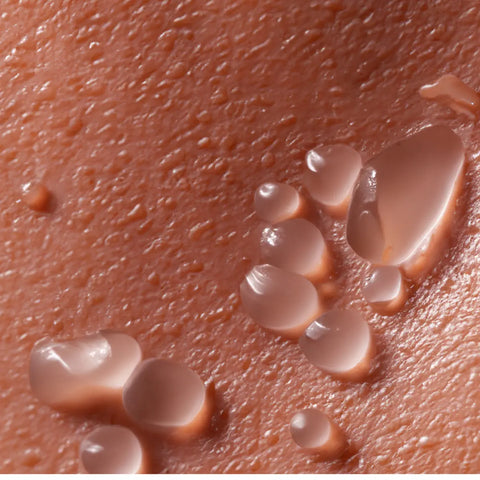Build Your Own Slick Salve Trio + Save
Dry Skin Vs. Dehydrated Skin
·Jacque Alec

Navigating the complexities of skin care, particularly when distinguishing between dry skin, can often feel overwhelming. This blog post aims to explain these conditions, offering a clear, comprehensive understanding of their differences, causes, and treatments. By exploring the nature of dry skin, characterized by a deficiency in natural oils, and contrasting it with dehydrated skin, which lacks water, we delve into the intricacies of skin health. These conditions, while similar in their symptoms of discomfort and visible distress, require distinct approaches for effective management. Our exploration goes beyond surface-level symptoms to address the root causes and specific care techniques necessary for each condition, aiming to empower readers with the knowledge to tailor their skincare routines for optimal health and comfort.

What Is Dry Skin?
Dry skin, also known as xerosis, is a common condition characterized by a lack of natural oils and moisture in the skin. It can be caused by a variety of factors, including genetics, environmental factors, and skin conditions such as eczema or psoriasis. Dry skin is often marked by rough, flaky, or scaly patches, as well as a feeling of tightness and itchiness. It can also be prone to redness, irritation, and cracking, especially in areas prone to frequent washing or exposure to the elements.
What Is Dehydrated Skin?
Dehydrated skin, on the other hand, is a condition in which the skin lacks water, rather than oils. It can occur as a result of a variety of factors, including diet, lifestyle, and environmental conditions. Dehydrated skin is often marked by a lack of elasticity and a dull, lifeless appearance. It can also be prone to redness, irritation, and sensitivity.
Similarities Between Dry & Dehydrated Skin
There are several similarities between dehydrated skin. Both can be caused by a variety of factors, including genetics, environmental conditions, and lifestyle habits. Both are also marked by a lack of moisture in the skin, which can lead to similar symptoms such as dryness, tightness, redness, and irritation.
Differences Between Dry & Dehydrated Skin
Understanding the distinction between dry skin and dehydrated skin is crucial for implementing an effective skincare routine. Although both conditions share symptoms that affect the skin's appearance and feel, their causes and treatments differ significantly. Below, the key differences between dry skin are expanded upon, providing a deeper insight into how to identify and address each condition.
- Cause - Dry skin is primarily caused by a lack of natural oils, or sebum, in the skin. This deficiency leads to compromised skin barrier function, making it difficult for the skin to retain moisture and protect itself from environmental aggressors. Factors contributing to dry skin include genetics, aging, hormonal changes, and environmental conditions such as cold or dry weather. On the other hand, dehydrated skin results from insufficient water intake and external factors like diet, lifestyle, and environmental exposure that lead to water loss from the skin. Understanding these causes is fundamental to choosing the correct treatment approach.
- Appearance - The appearance of dry skin is characterized by rough, flaky, or scaly patches, often accompanied by a feeling of tightness and discomfort. This texture is a result of the skin's inability to maintain moisture due to the lack of oil production. Conversely, dehydrated skin may not necessarily show visible flaking or roughness but will appear dull, and tired, and sometimes show signs of premature aging such as fine lines and wrinkles. This condition reflects the skin's lack of water content, affecting its plumpness and luminosity.
- Location - Dry skin frequently affects areas that are more exposed to environmental elements or subject to frequent washing, like the hands, face, and legs. These areas are more vulnerable to losing their natural oils, exacerbating dryness. In contrast, dehydrated skin does not discriminate by location—it can occur anywhere on the body, including the face, as it is related to the overall hydration levels of the body rather than localized oil production. This distinction is important for targeting treatment effectively.
- Treatment - Treating dry skin involves replenishing the natural oils and lipids that form the skin's barrier. This typically means using thick, creamy moisturizers, ointments, or oils that can provide a protective layer to help lock in moisture. Ingredients like hyaluronic acid and ceramides may also benefit dry skin by improving its ability to retain moisture. For dehydrated skin, the focus shifts towards increasing water content both internally and externally. Hydrating serums and lotions rich in water-binding ingredients, alongside a healthy intake of water and possibly altering lifestyle factors (such as reducing caffeine and alcohol consumption), are essential strategies for rehydrating the skin.
Understanding these differences is the first step in addressing skin concerns effectively. By recognizing whether the skin is dry, one can select appropriate products and treatments to restore its health and vitality. Adopting a tailored approach to skincare ensures that the skin receives the specific type of care it needs, leading to a healthier, more radiant complexion.

How To Care For Dry And Dehydrated Skin
Dealing with dry skin can be a challenging and often frustrating issue, affecting not only comfort but also confidence in one's appearance. However, understanding and implementing a comprehensive skincare routine can greatly alleviate these concerns and enhance skin health. Below are expanded tips to care for dehydrated skin, incorporating both preventative measures and direct treatments to ensure your skin remains hydrated and vibrant.
- Moisturize Regularly - Regular application of moisturizer for dry skin is crucial for maintaining skin's hydration levels. This practice helps to seal moisture into the skin, preventing dryness and flaking. It's essential to select a moisturizer that aligns with your skin type—whether oily, dry, or combination—as the right product can provide tailored benefits without aggravating the skin. For instance, those with dry skin might look for rich, emollient creams, while individuals with oily skin could prefer lighter, water-based formulas. By incorporating daily moisturization into your routine, you can significantly improve your skin's texture and resilience against environmental stressors.
- Use A Humidifier - Introducing a humidifier into your living or workspace can make a substantial difference in your skin’s moisture levels. The added humidity in the air prevents the skin from becoming too dry, especially in winter months or in air-conditioned environments where dry air is prevalent. Consistent use of a humidifier can complement your skincare routine by ensuring that the air around you contributes positively to your skin's hydration, making it an effortless yet effective tool for enhancing skin health.
- Drink Plenty Of Water - Hydration from within is just as important as topical treatments for maintaining skin's moisture balance. Drinking at least 8 glasses of water daily helps to hydrate your body and, by extension, your skin. This internal hydration is crucial for keeping the skin plump, elastic, and vibrant. Furthermore, adequate water intake supports overall health, which can reflect positively on the skin, reducing dullness and promoting a healthy glow.
- Avoid Hot Water And Harsh Cleansers - While hot showers can be comforting, hot water can strip the skin of its natural, protective oils, leading to increased dryness and irritation. Similarly, harsh cleansers that contain sulfates can disrupt the skin's moisture barrier. Opting for lukewarm water and gentle, sulfate-free cleansers helps preserve the skin's natural oils, maintaining its hydration and preventing discomfort.
- Protect Your Skin From The Elements - Environmental factors like the sun, wind, and cold can exacerbate skin dryness. Wearing protective clothing and applying broad-spectrum sunscreen with an appropriate SPF can shield your skin from UV damage and other aggressors. This protective measure not only prevents dryness but also wards off premature aging and skin damage, making it an essential part of any skincare routine.
- Avoid Or Limit Alcohol & Caffeine - Consuming alcohol and caffeine in moderation is crucial, as both can have dehydrating effects on the body. Reducing intake can prevent the exacerbation of dry skin conditions, supporting the skin's natural hydration processes. Balancing your diet to limit these substances can have a noticeable effect on your skin’s appearance and overall hydration levels.
- Eat A Healthy, Balanced Diet - A diet rich in fruits, vegetables, healthy fats, and proteins can profoundly impact skin health. These foods contain vitamins and minerals that support skin hydration and repair. Incorporating a variety of nutrient-dense foods into your diet can improve skin texture, elasticity, and moisture retention, offering a holistic approach to combating dry skin.
- Use Products For Dry Skin – Integrating products specifically formulated for dry skin, such as hydrating serum creams and exfoliant serum, can address concerns like rough texture or dull appearance. These products are designed to penetrate deeply, delivering moisture and nutrients that support skin health.
- Use Under Eye Masks – The skin under the eyes is particularly delicate and prone to dryness. Under-eye masks offer a targeted treatment, often infused with hydrating ingredients like hyaluronic acid or glycerin, to nourish and hydrate this sensitive area. Regular use can reduce dryness, fine lines, and puffiness, enhancing the overall appearance of the under-eye area and contributing to a more refreshed and vibrant look.
Incorporating these practices into your skincare routine can lead to noticeable improvements in your skin’s hydration and overall health. By addressing both the internal and external factors that influence skin condition, you can enjoy soft, supple, and hydrated skin regardless of the season or environment.
Additional Products and Treatments:
From body serums to specialized treatments, each product plays a crucial role in achieving a healthier, more vibrant skin complexion. Here’s a detailed look at the best solutions for those struggling with dryness and dehydration:
- Body Serum: Body serums provide a surge of hydration to the entire body with their nutrient-rich and lightweight formulas. These serums are ideal for improving skin texture and elasticity, often containing ingredients like hyaluronic acid and essential oils. They penetrate deeply into the skin, ensuring that moisture is delivered to the deeper layers and not just the surface, promoting long-term hydration and skin health. Regular use can transform dull, dry skin into a more supple and vibrant appearance.
- Moisturizer for Dry Skin: A high-quality face moisturizer for dry skin is typically rich in emollients and occlusives, which help to lock in moisture and provide a protective barrier. Ingredients such as shea butter and lanolin play a crucial role in repairing and maintaining the skin's moisture barrier. These moisturizers hydrate, making them an essential part of daily skincare for those with dry skin.
- Lotion for Dry Skin: Lotions formulated specifically for dry skin are lighter than creams and are perfect for daily use. They often contain hydrating and soothing agents such as aloe vera which attract and retain moisture in the skin. Such lotions help to maintain skin hydration throughout the day and are an excellent choice for those seeking a non-greasy formula that still offers effective moisture retention.
- Dry Skin Treatment: Special treatments like weekly hydrating masks or intensive overnight creams are vital for dry skin. These products are designed to provide an extra boost of moisture, often containing ingredients like glycerin and antioxidants that restore and rejuvenate the skin overnight. By incorporating these treatments into your weekly routine, you can ensure that your skin receives an intensive hydration session, aiding in its recovery and resilience against dryness.
- Serum Cream: Serum creams blend the concentrated active ingredients typically found in serums with the hydrating properties of creams. This combination is particularly beneficial for dehydrated skin, as it provides both water-based hydration and oil-based nourishment in one product. Ingredients like vitamin E, collagen, and retinol can address multiple skin concerns, including dryness and signs of aging, making serum creams a versatile addition to skincare routines.
- Fading Dark Spots: Dry skin can also suffer from uneven skin tone and hyperpigmentation. Treatments designed to fade dark spots often contain brightening ingredients such as vitamin C, niacinamide, and kojic acid. These compounds help to even out skin tone by inhibiting melanin production, which can be exacerbated by dryness and sun exposure. Consistent use of these treatments can lead to clearer, more radiant skin.
These tailored options not only provide essential moisture but also work to repair and rejuvenate skin, offering both immediate relief and long-term benefits. With the right skincare regimen, you can achieve a hydrated, glowing complexion that feels as healthy as it looks.

Understanding the nuances between dehydrated skin is pivotal for adopting a skincare routine that addresses the specific needs of your skin. As we've journeyed through the causes, appearances, and treatments for each condition, it becomes evident that a one-size-fits-all approach to skincare falls short. Whether integrating more hydrating products for dehydrated skin or opting for rich moisturizers to combat dryness, the key lies in recognizing and responding to your skin's unique needs. By doing so, you not only alleviate the immediate discomforts associated with dry skin but also contribute to the long-term health and resilience of your skin. Embracing this tailored approach allows you to enjoy a radiant, hydrated complexion, regardless of the challenges posed by environmental factors, lifestyle choices, or genetic predispositions.